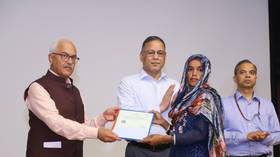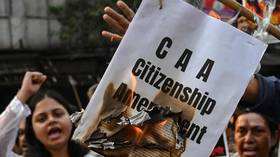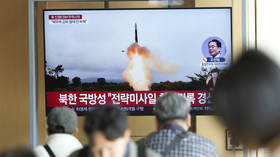India grants citizenship to over 300 refugees under divisive law

India has granted citizenship to the first group of immigrants under a new law that triggered nationwide protests when it was first enacted in 2019.
The Citizenship Amendment Act fast-tracks Indian citizenship to six minority communities (Hindus, Jains, Sikhs, Persis, Buddhists, Christians) from neighboring Muslim-majority nations Afghanistan, Pakistan, and Bangladesh who entered India on or before December 31, 2014. Despite being approved by both houses of the Indian parliament in 2019, the law only entered force in March this year.
Soon after, an online portal was set up to invite applications. The system requires would-be Indian citizens to declare their country of origin, and also submit at least one document tracing their roots to Bangladesh, Pakistan, or Afghanistan.
Union Home Secretary Shri Ajay Kumar Bhalla today handed over first set of citizenship certificates to some applicants after notification of Citizenship (Amendment) Rules, 2024.@PIB_India@DDNewslive@airnewsalerts Press Release-https://t.co/TBDXmfv3F1pic.twitter.com/o2dnsB3TVL
— Spokesperson, Ministry of Home Affairs (@PIBHomeAffairs) May 15, 2024
Around 300 people have been naturalized under the law, media reports suggested. Fourteen of them were handed their certificates by top New Delhi officials during a formal ceremony, the country’s Home Affairs Ministry said. According to The Hindu newspaper, the 14 new Indian citizens who received their certificates on Wednesday had entered the country from Pakistan in 2013.
Most of the refugees applying for citizenship are believed to be from Pakistan and living in the Gujarat, Chhattisgarh, Rajasthan, Haryana, Punjab, and Delhi regions.
“It is like my dream has come true; my heart is really happy and I feel like I have been born again,” Harish Kumar, who is originally from Pakistan but now lives in Delhi’s Majnu Ka Tilla locality, told the ANI news agency after receiving his citizenship certificate. “Because of these certificates, our children will now have access to education and other perks,” Arjun, another new Indian citizen, told the agency.
In 2019, the CAA triggered massive protests in northeast India, as residents consider themselves more prone to illegal immigration due to the porous nature of borders. Nationwide, at least 31 people died in the ensuing violence, according to reports in the local media.
Opposition parties have also vehemently decried the law, claiming that it discriminates on a religious basis.
The opposition bloc INDIA (or Indian National Developmental Inclusive Alliance) has suggested repealing the controversial law if voted into power in the ongoing election. However, the leaders of the ruling Bharatiya Janata Party (BJP), including Prime Minister Narendra Modi, have steadfastly stood by their decision to enact the law. “Nobody can remove the CAA,” Modi reiterated at a rally in Azamgarh, Uttar Pradesh, on Thursday.
The controversial law has also been a bone of contention between India and the US. When Washington said it was “closely monitoring” the law days after it was enforced, New Delhi reacted angrily by branding the US statement “misplaced, misinformed, and unwarranted.”
Where India Meets Russia – We are now on WhatsApp! Follow and share RT India in English and in Hindi












